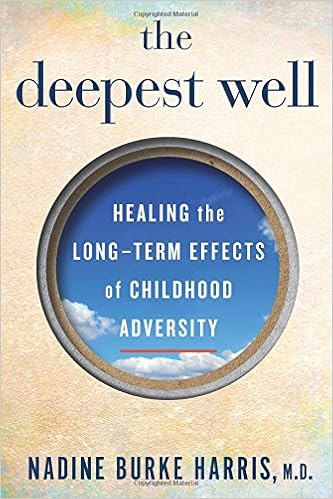 From Israel Rosenfield and Edward Ziff, in a discussion sparked by The Deepest Well: Healing the Long-Term Effects of Childhood Adversity (Houghton Mifflin Harcourt, 2018) at New York Review of Books:
From Israel Rosenfield and Edward Ziff, in a discussion sparked by The Deepest Well: Healing the Long-Term Effects of Childhood Adversity (Houghton Mifflin Harcourt, 2018) at New York Review of Books:
When the molecular structure of DNA was discovered in 1953, it became dogma in the teaching of biology that DNA and its coded information could not be altered in any way by the environment or a person’s way of life. The environment, it was known, could stimulate the expression of a gene. Having a light shone in one’s eyes or suffering pain, for instance, stimulates the activity of neurons and in doing so changes the activity of genes those neurons contain, producing instructions for making proteins or other molecules that play a central part in our bodies.
The structure of the DNA neighboring the gene provides a list of instructions—a gene program—that determines under what circumstances the gene is expressed. And it was held that these instructions could not be altered by the environment. Only mutations, which are errors introduced at random, could change the instructions or the information encoded in the gene itself and drive evolution through natural selection. Scientists discredited any Lamarckian claims that the environment can make lasting, perhaps heritable alterations in gene structure or function.
But new ideas closely related to Lamarck’s eighteenth-century views have become central to our understanding of genetics. In the past fifteen years these ideas—which belong to a developing field of study called epigenetics—have been discussed in numerous articles and several books, including Nessa Carey’s 2012 study The Epigenetic Revolution2 and The Deepest Well, a recent work on childhood trauma by the physician Nadine Burke Harris. More.
Epigenetics is another nail in the coffin of traditional Darwinism because the just-so stories of natural selection acting on random mutations depend, among other things, on the assumption that the inherited genome is a sort of lockbox with no influences other than its own random mutations. If the genome is as plastic as it now appears, many non-random factors influence it in predictable ways. The market for Darwinian just-so stories about how and why changes occur is likely to tank as the new approach sinks in.
See also: Early life experiences influence DNA in adult brain
and
Epigenetic change: Lamarck, wake up, you’re wanted in the conference room!